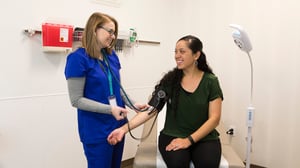February is American Heart Month, but it’s always a good time to take action to protect your heart health. Why?
Not just because your heart takes care of you every day by fueling your entire cardiovascular system. But also because heart disease is the leading cause of death in both men and women, according to the CDC. The good news is that there are also many effective (and simple) steps you can start taking right now to protect yourself from heart disease.
Serious heart health issues like heart attacks or strokes commonly manifest when people reach middle age, but it’s never too early to start protecting your heart health. In fact, preventive measures are the most effective when you start early.
Make a change for a healthier heart
Caring for your health isn’t always easy. When life gets busy, it can be a challenge to prioritize your own well-being. But you can strengthen your heart health by starting with these simple everyday choices.
3 simple steps towards a healthier heart
![]() 1. Get moving — Exercise is one of the most effective ways to protect your heart health. The American Heart Association recommends 150 minutes of moderate exercise, or 75 minutes of vigorous exercise, per week. Moderate exercise can include things like light jogging or hiking, while vigorous exercise includes running and other strenuous activities. Or, simply start with a walk around the block!
1. Get moving — Exercise is one of the most effective ways to protect your heart health. The American Heart Association recommends 150 minutes of moderate exercise, or 75 minutes of vigorous exercise, per week. Moderate exercise can include things like light jogging or hiking, while vigorous exercise includes running and other strenuous activities. Or, simply start with a walk around the block!
Here are some resources to help you get started:
- Stay Healthy With SMART Goals
- Aging Strong
- 6 Tips To Construct Fitness Goals As “Forever Habits”
 2. Make a healthy change to your diet — Focus on fueling your body with a few extra vegetables and healthy oils like Omega-3s. Reduce intake of alcohol and foods that are high in saturated fats, sugar, and sodium. One small change is all it takes to get started to reduce your risk of high cholesterol, diabetes, and heart disease.
2. Make a healthy change to your diet — Focus on fueling your body with a few extra vegetables and healthy oils like Omega-3s. Reduce intake of alcohol and foods that are high in saturated fats, sugar, and sodium. One small change is all it takes to get started to reduce your risk of high cholesterol, diabetes, and heart disease.
Here are some resources to help you get started:
- Behavior Change: 4 Ways To Make Positive Changes In Your Life
- Be Your Best You
- Why Eat Seasonally?
 3. Practice self-care to reduce stress — Lowering your stress helps to lower your blood pressure, which reduces your risk of heart disease. Give yourself time to do activities that help you relax, whether that means practicing meditation, giving yourself time to get a full night’s sleep, or simply spending time with friends.
3. Practice self-care to reduce stress — Lowering your stress helps to lower your blood pressure, which reduces your risk of heart disease. Give yourself time to do activities that help you relax, whether that means practicing meditation, giving yourself time to get a full night’s sleep, or simply spending time with friends.
Here are some resources to help you get started:
- Mindfulness: Relax, it's good for you
- Taking a Nature Break
- Stress Management That Works For You
- How To Practice Self-Care (And Why It’s Not Selfish)
Two additional goals that support your long-term heart health
You can take your heart health to the next level by making changes in these areas:
- Smoking cessation — Smoking is linked to poor heart health and an increased risk of coronary artery disease, heart attack, and stroke. Quitting smoking is one of the best ways to protect your heart.
- Healthy weight loss — This is a powerful way to reduce your risk of heart disease. One of the best ways to determine if you need to lose weight is to talk to your provider.
Whether you want to get more active, adjust your diet, reduce stress, quit smoking, or lose weight, remember you don’t have to do it on your own. Your care team is ready and waiting to help you break down your goals into a step-by-step plan that’s customized for you, and they’ll support you every step of the way.
When to talk to a provider about your heart health
It’s essential to see your primary care provider at least once a year, to keep track of your overall well-being as well as your heart health. When you visit your Vera care center, you’ll have all the time you need to talk with your provider about all the factors that influence your health.
If you have a family medical history of heart disease, it’s especially important to be proactive. But regardless of what risk factors you do (or don’t) have, it’s always a good idea to talk to your provider about your heart health. They can also help connect you with a health coach to give you additional support.
Your health is your future. Schedule your annual whole health visit today.
Sign up
Join our email list to receive the latest open positions, Vera Careers news, and more.





